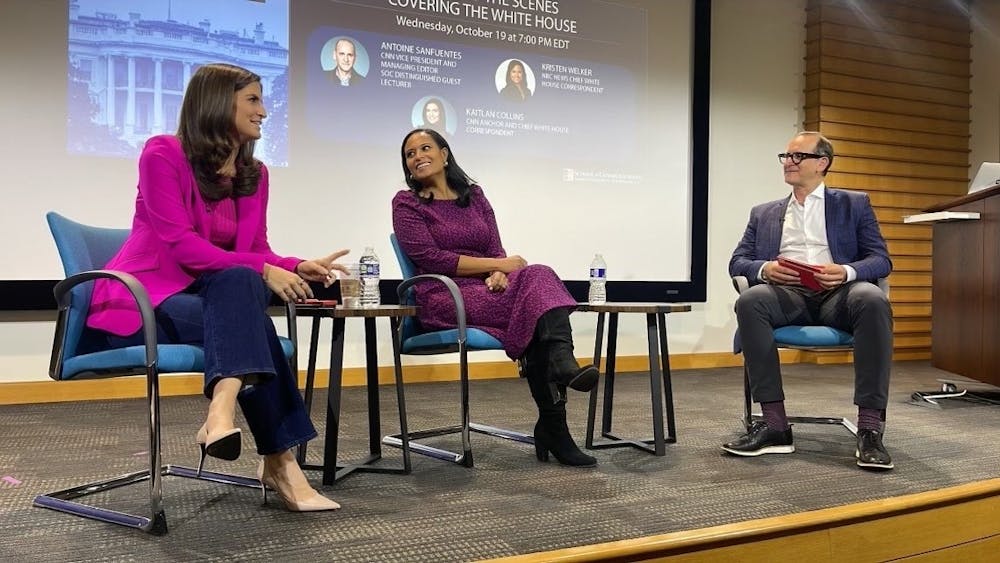CNN’s Kaitlan Collins and NBC’s Kristen Welker gave the AU community an inside look at covering the presidency at an event Oct. 19 co-hosted by the Kennedy Political Union and the School of Communication.
Collins and Welker, who are both chief White House correspondents, discussed how they learn to push back at elected officials in their roles, with CNN Vice President and Managing Editor for CNN's White House and Capitol Hill Coverage and SOC Distinguished Guest Lecturer Antoine Sanfuentes.
“What helps you push back is that you have to know your shit,” Collins said.
Welker spoke about her recent interview with Georgia Senate candidate Hershel Walker, and how she persevered to get access to him.
Although Welker usually reports on the White House, preparing for an hour-long interview with a candidate required a team to research and develop interview questions. By the end of the interview, Welker said she had no questions left to ask, and that Walker’s interview style was similar to former president Donald Trump’s back-and-forth.
“It went back to the preparation that gave me the confidence to do that interview on relatively short notice,” Welker said.
In an interview with The Eagle after the event, Collins spoke about the transition between covering the Trump and Biden administrations.
Though a “tough” transition, Collins worked to understand the new president’s tactics and staff.
“That’s what’s so cool, covering the White House, is seeing different governing styles and the way certain people acted in office,” Collins told The Eagle.
At a press briefing in Geneva, President Joe Biden was upset when Collins asked why he was “confident” that Russian President Vladimir Putin will change his behavior. When Biden asked “what do you do all the time?” Collins continued to press the question.
Listening to Putin’s earlier press conference and understanding his position put Collins in “that moment to push back” at Biden.
Collins and Welker also gave advice to students, telling them to always ask questions.
Welker told students to be confident when they get their first jobs because they earned it for a reason, and to learn from mentors when they feel unsure in a new role.
“I think the way to deal with that is to do the work and find the people around you who are willing to talk you through it,” Welker said. “I would also say it's about not giving up.”
Collins spoke about feeling “pure terror” as she looked for jobs after graduating from the University of Alabama in 2014. Although students may not get their dream job straight out of school, she said early jobs can set them up for future positions.
“That doesn’t mean that [that] job can’t teach you a lot and you can’t learn a lot and position yourself in a way that sets you up for something in the future you can’t even imagine,” Collins said.
Collins and Welker also discussed what it is like to be a part of the press corps and closely follow the president and the White House.
Even though from the outside covering the White House may look competitive, the two correspondents said working with journalists from other networks is collegial. The reporters will work together to make sure the necessary questions are being asked.
Sanfuentes called this “hunting in packs.” Collins and Welker went on to describe the time when they teamed up to ask Trump some hard questions at the annual Easter egg roll. While Welker asked the president how his Easter was going, Collins was able to follow up with a harder question.
“We really do have each other’s backs,” Welker said.
At the start of the Biden administration in 2021, ABC, CBS, NBC and CNN all had women leading the networks’ coverage of the White House. Both Collins and Welker noted how much more diverse the White House press room is since they both started.
“One of the things I’m so proud of is there is a real sisterhood partly because there are so many women White House correspondents,” Welker said.
Looking forward, the two hope to help restore more trust in their reporting, as some Americans today distrust parts of the media. Part of the Trump administration’s tactics, they said, was to undermine their credibility as journalists.
Collins spoke about the time former Trump Press Secretary Kayleigh McEnany referred to her as an “activist.” While Collins said she knew the comment was unprofessional, she had to keep her composure in the moment to continue to report on the facts.
Collins said people sometimes stop her when she travels in airports to tell her their opinions of CNN. But when she talks to people about the work she does behind the scenes, Collins thinks it really changes their point of view.
“People are so divided and bolstered and so many people think that the country is headed on the wrong path, how do you play a role in helping restore the media's credibility in the way that it returns to something people can rely on and count on,” Collins said.
Correction: A previous version of this article incorrectly stated that Antoine Sanfuentes is the Washington Bureau Chief for CNN. It has been updated to reflect that he is the Vice President and Managing Editor for CNN's White House and Capitol Hill Coverage.





